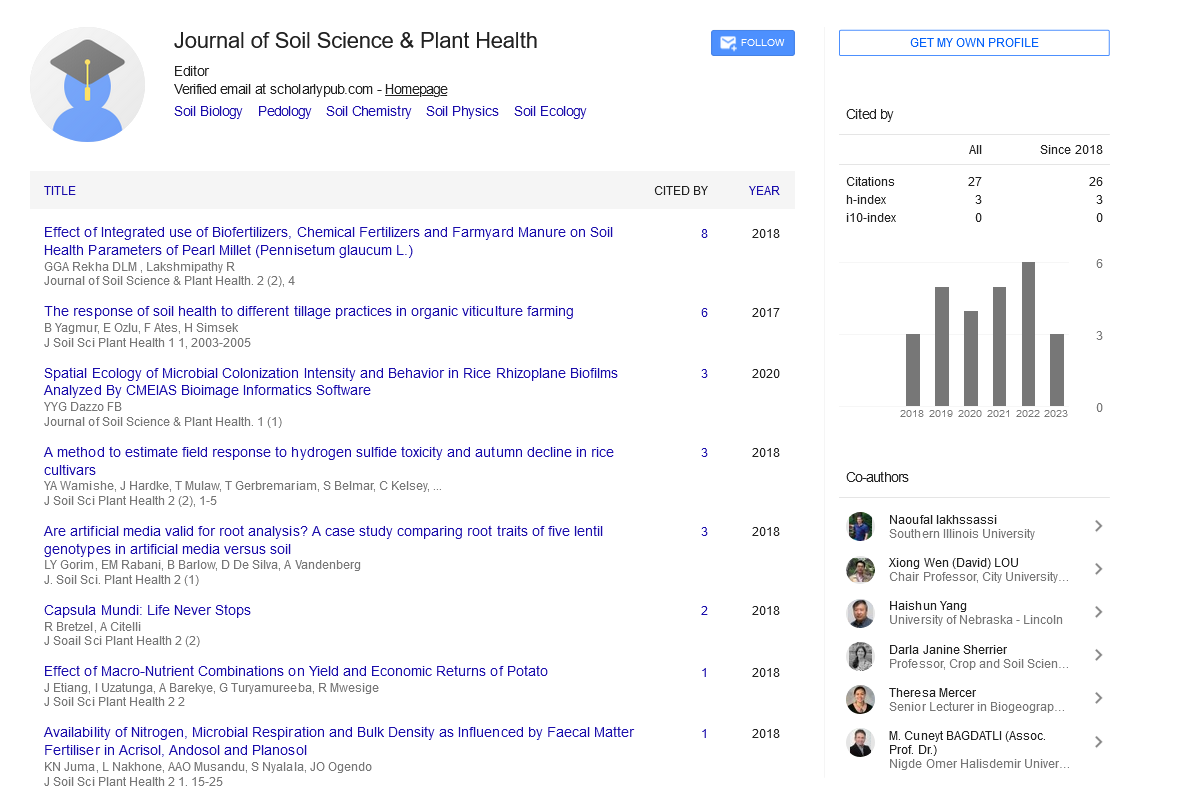Commentary, J Soil Sci Plant Health Vol: 8 Issue: 1
Nutrient Management in Precision Agriculture for Enhanced Plant Health
Jimin Hyung*
Department of Agriculture and Biotechnology, Huazhong Agricultural University, No. 1 Shizishan Street, Hongshan District, Wuhan 430070, Hubei Province, China
- *Corresponding Author:
- Jimin Hyung
Department of Agriculture and Biotechnology,
Huazhong Agricultural University,
No. 1
Shizishan Street,
Hongshan District,
Wuhan 430070,
Hubei Province,
China
E-mail: jimin23@gmail.com
Received date: 27 October, 2023, Manuscript No. JSPH-23-118477;
Editor assigned date: 30 October, 2023, PreQC No. JSPH-23-118477 (PQ);
Reviewed date: 13 November, 2023, QC No. JSPH-23-118477;
Revised date: 05 January, 2024, Manuscript No. JSPH-23-118477 (R);
Published date: 12 January, 2024, DOI: 10.4172/jsph.1000220
Citation: Hyung J (2024) Nutrient Management in Precision Agriculture for Enhanced Plant Health. J Soil Sci Plant Health J 8:1.
Description
Precision agriculture, an innovative and technology-driven approach to farming, has transformed the way we manage agricultural systems. The role of precision agriculture in nutrient management, highlighting its significance in enhancing plant health and optimizing agricultural sustainability. Precision agriculture is a data-driven approach to farming that integrates technology, information, and decision-making to maximize the efficiency and effectiveness of agricultural practices. At its core, precision agriculture aims to tailor the application of resources, including nutrients, to the specific needs of individual crops and even individual parts of a field.
Precision agriculture, often referred to as smart farming, is a farming management concept that utilizes technology to optimize the management of resources, such as water, fertilizers, and pesticides, at a precision level. The core principles of precision agriculture include:
• Gathering accurate and detailed information about the field, crops,
and environmental conditions through remote sensing, GPS, and
sensors.
• Analyzing the collected data to make informed decisions about
resource management.
• Applying inputs, such as nutrients and water, in variable rates based
on the specific needs of different parts of the field.
• The use of automated machinery and robotics for planting,
harvesting, and monitoring.
Nutrient management is a crucial aspect of precision agriculture, involving the precise application of fertilizers and other nutrients to optimize plant health and crop yield. Key components of nutrient management in precision agriculture include:
• Detailed soil testing and analysis to assess nutrient levels and pH in
different parts of the field.
• The application of fertilizers at variable rates based on soil test
results, historical data, and crop requirements.
• The use of remote sensing technologies, such as drones and
satellites, to monitor crop health and nutrient deficiencies.
• Continuous monitoring of nutrient levels in the soil and the crop to
make timely adjustments.
• Integration of various data sources, including soil tests, remote
sensing, and weather data, to make informed decisions.
• Precision agriculture's nutrient management strategies have a direct
impact on plant health: Precision agriculture ensures that crops
receive the right nutrients in the right amounts at the right time,
promoting optimal plant growth and health.
• Precision application minimizes nutrient wastage, reducing the risk
of nutrient runoff and water pollution.
• Remote sensing technologies allow for the early detection of
nutrient deficiencies or stress in crops, enabling timely corrective
measures.
• Precision agriculture provides a customized approach to nutrient
management, addressing the specific needs of different parts of the
field.
While precision agriculture offers significant advantages in nutrient management and plant health, there are challenges to consider:
• Implementing precision agriculture requires an initial investment in
technology and equipment.
• The integration of various data sources and management of large
datasets can be complex.
• Farmers and agriculture professionals need to adapt to new
technologies and methodologies.
• The environmental impact of precision agriculture, including the
energy use of technology, needs to be considered.
Conclusion
Precision agriculture has revolutionized nutrient management in farming by leveraging technology to enhance plant health and optimize resource utilization. The precise application of nutrients based on real-time data and field-specific needs contributes to increased crop productivity and reduced environmental impact. As the world faces increasing demands for food production and environmental sustainability, precision agriculture's role in nutrient management becomes more critical than ever. The integration of technology, data analysis, and informed decision-making allows for the optimization of nutrient applications, ultimately leading to enhanced plant health, increased crop yields, and reduced environmental impact. As the agricultural industry continues to evolve, precision nutrient management will play an increasingly vital role in ensuring sustainable and productive farming practices. By embracing this approach, we can enhance plant health, improve agricultural sustainability, and meet the challenges of feeding a growing global population.
 Spanish
Spanish  Chinese
Chinese  Russian
Russian  German
German  French
French  Japanese
Japanese  Portuguese
Portuguese  Hindi
Hindi 